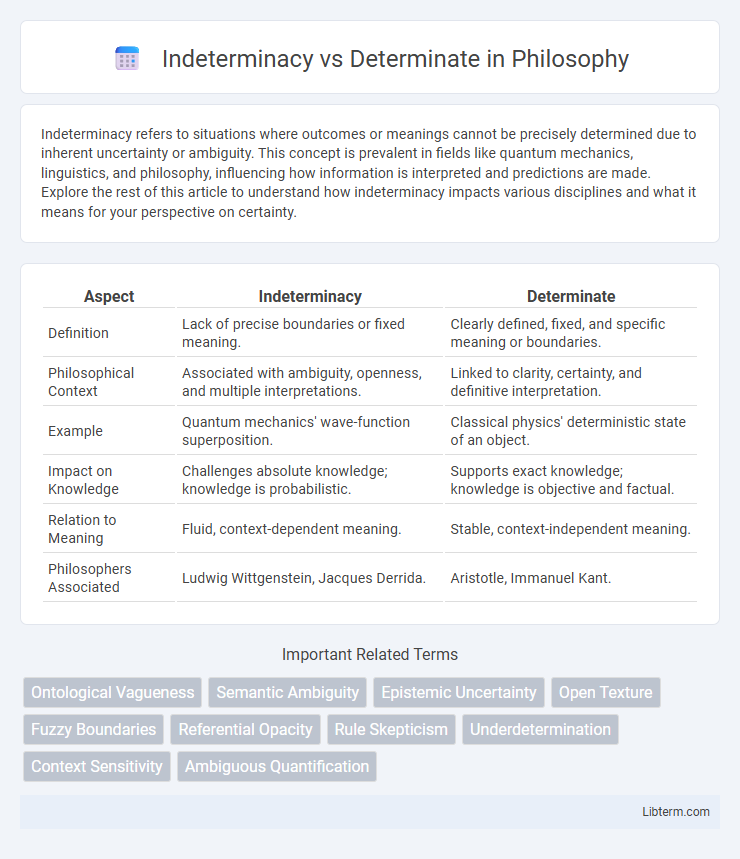Indeterminacy refers to situations where outcomes or meanings cannot be precisely determined due to inherent uncertainty or ambiguity. This concept is prevalent in fields like quantum mechanics, linguistics, and philosophy, influencing how information is interpreted and predictions are made. Explore the rest of this article to understand how indeterminacy impacts various disciplines and what it means for your perspective on certainty.
Table of Comparison
| Aspect | Indeterminacy | Determinate |
|---|---|---|
| Definition | Lack of precise boundaries or fixed meaning. | Clearly defined, fixed, and specific meaning or boundaries. |
| Philosophical Context | Associated with ambiguity, openness, and multiple interpretations. | Linked to clarity, certainty, and definitive interpretation. |
| Example | Quantum mechanics' wave-function superposition. | Classical physics' deterministic state of an object. |
| Impact on Knowledge | Challenges absolute knowledge; knowledge is probabilistic. | Supports exact knowledge; knowledge is objective and factual. |
| Relation to Meaning | Fluid, context-dependent meaning. | Stable, context-independent meaning. |
| Philosophers Associated | Ludwig Wittgenstein, Jacques Derrida. | Aristotle, Immanuel Kant. |
Understanding Indeterminacy: A Conceptual Overview
Indeterminacy refers to situations where outcomes or meanings cannot be precisely predicted or determined due to inherent uncertainty or complexity, often discussed in quantum mechanics, linguistics, and legal theory. It contrasts with determinate conditions, which are clearly defined and predictable, allowing for exact conclusions or results. Understanding indeterminacy involves exploring its implications on decision-making, interpretation, and the limits of knowledge in various scientific and philosophical domains.
Defining Determinacy: Clarity and Precision
Determinacy refers to the clarity and precision in meaning, where concepts, statements, or conditions are well-defined and unambiguous. This quality ensures consistent interpretation and reliable application, reducing confusion and miscommunication in legal, linguistic, or philosophical contexts. Emphasizing definitional exactness supports effective decision-making and analytical rigor in determining outcomes or understanding propositions.
Key Differences Between Indeterminacy and Determinacy
Indeterminacy refers to situations or systems where outcomes cannot be precisely predicted due to variability or lack of fixed parameters, while determinacy denotes conditions where results are definite and predictable based on set rules or initial states. The key difference lies in predictability; determinate systems yield consistent and specific outcomes, whereas indeterminate systems exhibit uncertainty and multiple possible results. This contrast is fundamental in fields like mathematics, law, and linguistics, where clarity and predictability influence interpretation and decision-making.
Historical Perspectives on Indeterminacy and Determinacy
Historical perspectives on indeterminacy and determinacy trace back to ancient philosophy, where Plato emphasized determinate forms as ideal realities, while Aristotle introduced potentiality, hinting at indeterminacy in nature. The medieval scholastics debated divine omniscience and human free will, balancing determinacy in God's foreknowledge with indeterminacy in human actions. Modern developments emerged with quantum mechanics challenging classical determinacy, highlighting inherent indeterminacies at the fundamental level of physical reality.
Indeterminacy in Philosophy and Logic
Indeterminacy in philosophy and logic refers to situations where meaning, truth, or outcomes cannot be precisely determined due to ambiguous or incomplete information. This concept challenges classical logic principles by allowing multiple, equally valid interpretations or truth values, often explored through semantic indeterminacy and quantum logic frameworks. Indeterminacy plays a crucial role in understanding linguistic ambiguity, paradoxes, and the limits of formal systems.
Applications of Determinacy in Science and Mathematics
Determinacy in science and mathematics ensures predictable outcomes in systems governed by fixed rules, such as deterministic algorithms in computing and differential equations modeling physical phenomena. It enables precise solutions in mathematical logic, game theory, and systems analysis, where the absence of ambiguity allows for rigorous proofs and reliable predictions. Applications include physics simulations, cryptographic protocols, and deterministic finite automata used in automata theory for language recognition.
The Role of Context in Determinacy and Indeterminacy
The role of context is crucial in determining whether meaning is determinate or indeterminate in linguistic expressions. Context provides the necessary background information that resolves ambiguities and specifies reference, enabling precise interpretation of otherwise vague or polysemous terms. Without sufficient contextual clues, utterances may remain indeterminate, highlighting the dynamic interplay between semantic content and pragmatic factors.
Implications for Decision-Making: Indeterminate vs Determinate
Indeterminate scenarios involve undefined or incomplete information, leading to ambiguity that complicates decision-making by increasing uncertainty and risk. Determinate situations, marked by clear, precise data and predictable outcomes, enhance decision accuracy and strategic planning. Understanding the difference between indeterminacy and determinacy improves risk assessment and optimizes resource allocation in critical decision processes.
Indeterminacy and Ambiguity in Language and Art
Indeterminacy in language and art refers to the inherent openness and multiple interpretations that arise from ambiguous symbols, expressions, or narratives, allowing for diverse audience responses. Ambiguity amplifies this effect by introducing elements that lack a single, fixed meaning, encouraging subjective engagement and creative exploration. This contrasts with determinate structures, where meanings and intentions are explicitly defined and constrained.
Navigating Uncertainty: Striking a Balance Between Indeterminacy and Determinacy
Navigating uncertainty requires balancing indeterminacy, where outcomes remain open and flexible, with determinacy, characterized by clear, defined parameters and predictable results. Embracing indeterminacy allows adaptive strategies and innovation in volatile environments, while determinacy ensures stability, accountability, and efficient decision-making. Effective management integrates both by setting structured goals while allowing room for adjustments in response to emerging data and unforeseen challenges.
Indeterminacy Infographic

 libterm.com
libterm.com